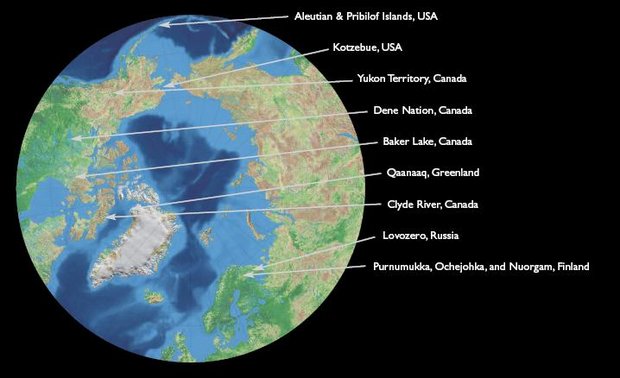Indigenous peoples (main)
From The Encyclopedia of Earth
Indigenous peoples
-
 Featured Article
Featured Article  Changes in the Landscape of Arctic Traditional...This article, written by Tim Lougheed*, appeared first in Environmental Health Perspectives—the peer-reviewed, open access journal of the National Institute of... More »
Changes in the Landscape of Arctic Traditional...This article, written by Tim Lougheed*, appeared first in Environmental Health Perspectives—the peer-reviewed, open access journal of the National Institute of... More »
Recently Updated
 Arctic climate change case studies using indigenous knowledge Last Updated on 2015-07-09 00:12:54 This is Section 3.4 of the Arctic Climate Impact Assessment Lead Authors: Henry Huntington, Shari Fox; Contributing Authors: Fikret Berkes, Igor Krupnik; Case Study Authors are identified on specific case studies; Consulting Authors: Anne Henshaw,Terry Fenge, Scot Nickels, Simon Wilson Indigenous perspectives on the changing Arctic vary widely over time and space, as may be expected given the differences between the histories, cultures, ways of life, social and economic situations, geographical locations, and other characteristics of the many peoples of the region. These perspectives cannot be illustrated by generalizations nor, in the space allotted and with the materials currently available, comprehensively for the entire Arctic. The case studies used in the Arctic Climate Impact Assessment were chosen as illustrations of indigenous perspectives on climate change, and were drawn... More »
Arctic climate change case studies using indigenous knowledge Last Updated on 2015-07-09 00:12:54 This is Section 3.4 of the Arctic Climate Impact Assessment Lead Authors: Henry Huntington, Shari Fox; Contributing Authors: Fikret Berkes, Igor Krupnik; Case Study Authors are identified on specific case studies; Consulting Authors: Anne Henshaw,Terry Fenge, Scot Nickels, Simon Wilson Indigenous perspectives on the changing Arctic vary widely over time and space, as may be expected given the differences between the histories, cultures, ways of life, social and economic situations, geographical locations, and other characteristics of the many peoples of the region. These perspectives cannot be illustrated by generalizations nor, in the space allotted and with the materials currently available, comprehensively for the entire Arctic. The case studies used in the Arctic Climate Impact Assessment were chosen as illustrations of indigenous perspectives on climate change, and were drawn... More »  Changes in the Landscape of Arctic Traditional Food Last Updated on 2013-10-21 23:45:06 This article, written by Tim Lougheed*, appeared first in Environmental Health Perspectives—the peer-reviewed, open access journal of the National Institute of Environmental Health Sciences. The article is a verbatim version of the original and is not available for edits or additions by Encyclopedia of Earth editors or authors. Companion articles on the same topic that are editable may exist within the Encyclopedia of Earth. The Changing Landscape of Arctic Traditional Food The earliest European explorers seeking a northwest passage to Asia did not know what to make of the indigenous inhabitants they encountered in what is now Canada. In the 1500s, Martin Frobisher thought they were Asians and took a number as slaves; none survived more than a few weeks in captivity. Later adventurers acquired a profound respect for the knowledge that had enabled Inuit (“the... More »
Changes in the Landscape of Arctic Traditional Food Last Updated on 2013-10-21 23:45:06 This article, written by Tim Lougheed*, appeared first in Environmental Health Perspectives—the peer-reviewed, open access journal of the National Institute of Environmental Health Sciences. The article is a verbatim version of the original and is not available for edits or additions by Encyclopedia of Earth editors or authors. Companion articles on the same topic that are editable may exist within the Encyclopedia of Earth. The Changing Landscape of Arctic Traditional Food The earliest European explorers seeking a northwest passage to Asia did not know what to make of the indigenous inhabitants they encountered in what is now Canada. In the 1500s, Martin Frobisher thought they were Asians and took a number as slaves; none survived more than a few weeks in captivity. Later adventurers acquired a profound respect for the knowledge that had enabled Inuit (“the... More »  Climate change impacts on Indigenous peoples of the Russian North Last Updated on 2009-09-28 13:44:23 This is Section 12.3.4 of the Arctic Climate Impact Assessment Lead Author: Mark Nuttall; Contributing Authors: Fikret Berkes, Bruce Forbes, Gary Kofinas,Tatiana Vlassova, George Wenzel This case study is based on the ongoing work of the Russian Association of Indigenous Peoples of the North (RAIPON), together with the NorthSet project of the Institute of Geography at the Russian Academy of Sciences. This work concerns the assessment of climate change impacts on the indigenous peoples of the Russian North within the context of broader social, economic, and political changes. This case study is based on the preliminary results of initial research, but is included here because it illustrates the tremendous challenges faced by indigenous peoples throughout the Russian North. The indigenous peoples of the Russian North have depended on traditional hunting,... More »
Climate change impacts on Indigenous peoples of the Russian North Last Updated on 2009-09-28 13:44:23 This is Section 12.3.4 of the Arctic Climate Impact Assessment Lead Author: Mark Nuttall; Contributing Authors: Fikret Berkes, Bruce Forbes, Gary Kofinas,Tatiana Vlassova, George Wenzel This case study is based on the ongoing work of the Russian Association of Indigenous Peoples of the North (RAIPON), together with the NorthSet project of the Institute of Geography at the Russian Academy of Sciences. This work concerns the assessment of climate change impacts on the indigenous peoples of the Russian North within the context of broader social, economic, and political changes. This case study is based on the preliminary results of initial research, but is included here because it illustrates the tremendous challenges faced by indigenous peoples throughout the Russian North. The indigenous peoples of the Russian North have depended on traditional hunting,... More »